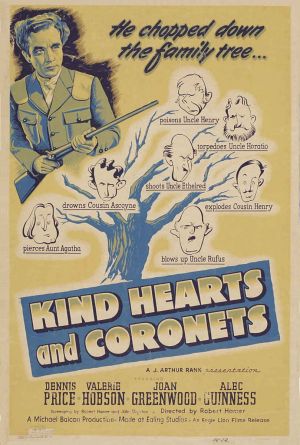
KIND HEARTS AND CORONETS
UK, 1949, 106 minutes, Black and white.
Dennis Price, Valerie Hobson, Joan Greenwood, Alec Guinness, Miles Malleson, Clive Morton, Hugh Griffith.
Directed by Robert Hamer.
Kind Hearts and Coronets is considered one of the greatest classics from Ealing Studios. In the immediate post-war period, many of the British films being made were historical melodramas. However, Ealing Studios began a series of comedies, many of them written by T.E.B. Clark and directed by a group of directors who excelled in this kind of genre. They include the present director, Robert Hamer, as well as Charles Creighton, Henry Cornelius.
The film is now famous for Alec Guinness’s portrayal of eight different characters of the one family. They range from a duke to a banker, a parson and a general, and admiral to a young man as well as Lady Agatha. They are all to be eliminated by Louis, the claimant to the family fortune. Lois is in prison, offering his memoirs to the audience. He is a sardonic character played by Dennis Price at his best. The leading ladies are two of the actresses prominent at the period who appeared in other films with Guinness including The Card: Valerie Hobson and Joan Greenwood.
The film is an excellent example of British humour, well and wittily written, expertly acted, with a strong sense of irony.
1. This is considered an English classic of Ealing Studios comedy. Why is this?
2. How successful was the narrative technique for the film? The precision and the wit of Louis Mazzini and his narrative? The wit and the dialogue throughout the film, the technique of the flashbacks and our knowledge of his being about to be hanged? The irony in the whole film, the significance of the titles and the meaning of Kind Hearts and Coronets? What other technical advantages did the film have? The use of pointed brief scenes for making points and for comedy?
3. How very British were the characters and the humour of the film? How much did the film rely on British characteristics and humour for its success?
4. How successful a satire on the British was the film? On the historical background of the class structure of snobbery, of the clash between classes and the presupposition of the rich about status and more, of the British and the Italians, as regards ambition? How successful was the dialogue in indicating the satiric tone about the aristocracy?
5. How did the film reverse moral values? Where was our sympathy? Did the film outrage sensitivity to moral stances? Or was this successful black comedy taking a situation and making a joke of it? Is this a valid way of conveying a moral situation?
6. Was Louis a sympathetic character? Our first seeing him? The admission of his guilt? The fact that he was guilty? The humour of his snobbery? The influence of his mother and upbringing? His ambitions? His cold cruelty? His relationship with Sybilla? His using Edith? What motivated him really for the murders?
7. What did the film have to say about the influence of family and status? Of the desirability of titles? Of losing one’s soul for the whole world?
8. How unattractive a character was Sybilla? How old was she ? How selfish? Did she ever disguise her motives? Why did she marry Lionel? How cruel was this? How did she treat Louis? Did she have any redeeming features?
9. How did Edith contrast with this? Her primness with Louis’ nobility? Her goodness? Her loyalty to Louis?
10. How interesting was the presentation of the Gascoyne family? How successful was Alec Guinness in creating eight different parts? How did he vary the characters? While showing their family relationship? What was being attacked in the Gascoyne family and their selfishness? The smugness of the young aristocratic man, the good nature of Henry who had to drink on the sly? the boring, pedantic nature of the parson, the selfishness and arrogance of the count, Agatha and her suffragette work, the idiotic nature of the admiral going down with his ship, the boring stories of the ex-general? How did the others form a contrast with this? At least he was redeemed after the death of his son? And he died a fairly natural death although ironic? Note the fact that only the last death, of the count who was the most selfish, was in any way cruel and cold-blooded on Louis’ part. How important was this? As regards the seriousness of the deaths? Contrasting with the farcical nature of the others?
11. How interesting was the trial sequence? Why? the irony of his release at the last moment? His decisions about the two women?
12. What did the sequence with the hangman add to the film? At the beginning for an ironic and facetious sense of humour? At the end for the story and for a presumption of the honour?
13. How much good taste is there in humour about death?
14. The film is considered a masterpiece. Rightly?